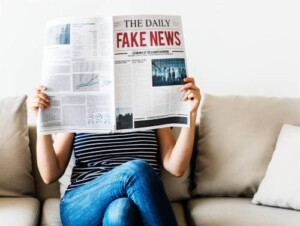
For the past 12 months, we have heard a lot about fake news. There has been a lot of finger pointing at Facebook while news agencies claim a victory in their fight for relevancy. Amongst it all, business is left to ponder who else is guilty of fake news in an effort to boost their bottom line?
The problem is not Facebook
Plenty is being written about Mark Zuckerberg and how Facebook could allow data to be used to manipulate an election. The use of data is an important debate, but for small to medium businesses, the concern should be much more real, small businesses might have to get themselves a consultant. At the heart of the problem here is the fact that people believe everything they read. There is no checking of legitimate sources.
It is tough to know what is real and what is fake. 30 years ago, if it is was in the media, there was a level of accountability. Journalists investigated before they published. Now the fight to get content published is driven by a 24-hour news cycle which is as much about the general public beating them to it as it is worrying about their competitors.
 Plenty is being written about Mark Zuckerberg and how Facebook could allow data to be used to manipulate an election. The use of data is an important debate, but for small to medium businesses, the concern should be much more real, small businesses might have to get themselves a consultant. At the heart of the problem here is the fact that people believe everything they read. There is no checking of legitimate sources.
Plenty is being written about Mark Zuckerberg and how Facebook could allow data to be used to manipulate an election. The use of data is an important debate, but for small to medium businesses, the concern should be much more real, small businesses might have to get themselves a consultant. At the heart of the problem here is the fact that people believe everything they read. There is no checking of legitimate sources.
It is tough to know what is real and what is fake. 30 years ago, if it is was in the media, there was a level of accountability. Journalists investigated before they published. Now the fight to get content published is driven by a 24-hour news cycle which is as much about the general public beating them to it as it is worrying about their competitors.
Should you pay attention to reviews?
Let’s look at this in another way. When you are looking to make a purchase, you read up about the options online, including taking note of the reviews. The more cynical amongst us will consider reviews to be written by two types of people; those who are angry and those who are aligned directly or indirectly with the business already. Much like when you are seeing to hire a staff member, and you do a reference check, in the majority of cases you know the people you will be talking to will sing their praises.
Do we put reviews in the category of ‘fake news’, because they are easy to manipulate? Just because you can, does it mean you should flood your online presence with positive reviews?
I could go on about the need for change in our education system, so the next generation is better equipped to identify what is real. However, this does not help businesses in the short term.
If you are on Facebook, check out your news feed and see how many business sponsored posts you encounter. Are the likes and comments enough of a guide as to whether the offering is good? What if you can’t find much else about them, outside of their website, online? Does it make them seem more or less authentic because reviews have not tainted them?
Advertisers have been employing fake news tactics for years
Unfortunately, fake news in marketing is not new. The public has been manipulated through advertising for a long time. The fact is we trust people who look scientific, so we see ads with people in lab coats, even though there is no real suggestion of proven methodology. Statistics are thrown out without anyone questioning their foundation. I know of one prominent advertiser who claims a 98% success rate, while turning away people they know they will not be able to help.
What is the answer?
If you are marketing your business, there is one clear method you can use to distinguish yourself from the false claims of competitors – be authentic. If you’re wondering whether or not your brand really matters, the answer is: The messages you deliver along with how and where you deliver them, combined with how you respond to your audience is where you need be most authentic. Trust that people will ultimately know what is real.
Don’t overpromise. Always demonstrate your level care of enthusiasm, versus trying to tell people how you go about your business.
Regular research reveals the most authentic brands belong to not-for-profit organisations, especially charities. The belief in running a brand, not motivated be delivering profits to shareholders, who in their way is trying to change the world, is we believe, intrinsically authentic. There is much for a business to learn from this behaviour.
5 Tips for small to medium businesses to avoid the threat of fake news
- Say what you mean and mean what you say. Get the core of your brand, your definition, vision, mission and values statements reflecting who you are and your unique place in the market. Review them annually.
- Monitor what is being said about you online and respond to it.
- Don’t forget the local human element to your offer. People do business with people.
- Look for new ways to reach out to your audience with messages and materials from you, not templated, library or auto-generated.
- Keep creating new content, building your profile and demonstrating your knowledge.
Ultimately your business needs to be an authority in the community you are targeting. Build a level of trust in your brand by being authentic. Demonstrate the power of the solution you are offering instead of just spruiking about it. Encourage your audience to experience your business first hand without obligation. Let them engage one on one with you because it is the direct human element which makes it much harder to be fake.
